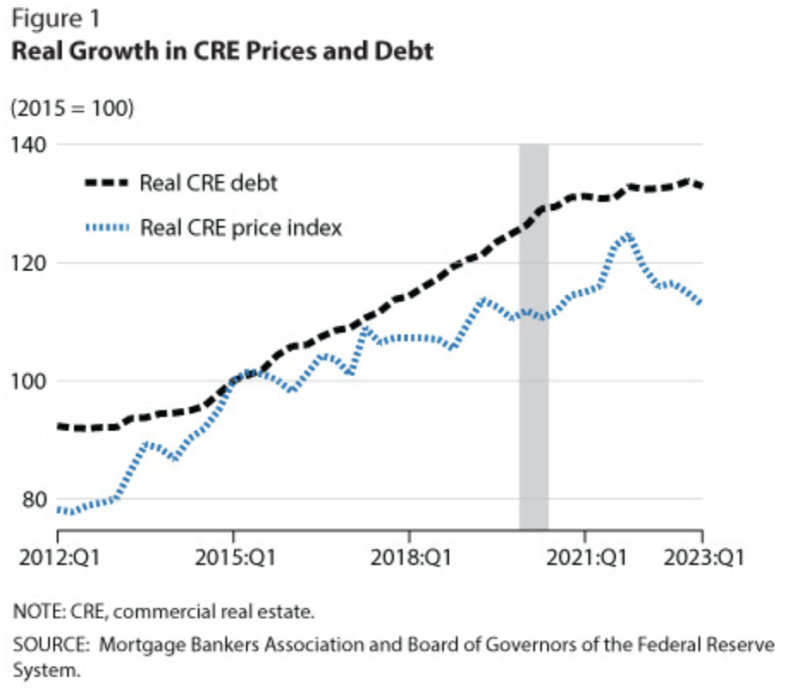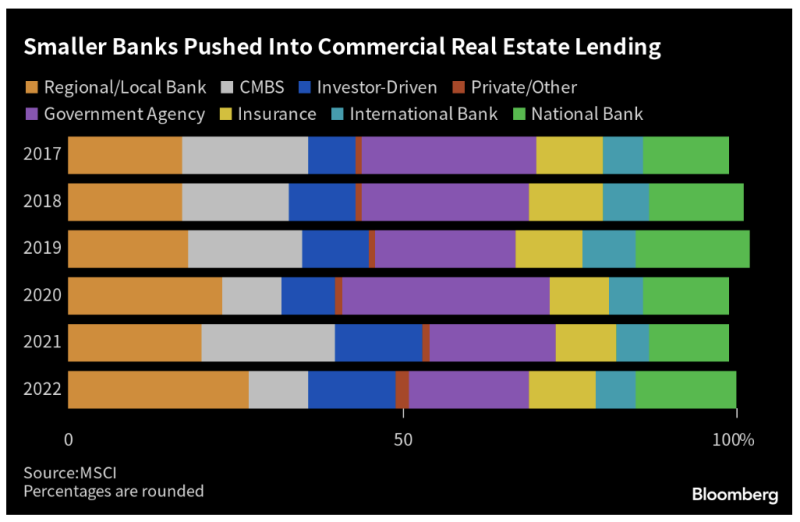
Posted on 03/25/2024 1:35:01 PM PDT by Heartlander
In case you’ve still got money in a bank, Bloomberg is warning that defaults in commercial real estate loans could “topple” hundreds of US banks.
Leaving taxpayers on the hook for trillions in losses.
The note, by Senior Editor James Crombie, walks us through the festering hellscape that is commercial real estate.

To set the mood, a new study predicts that nearly half of downtown Pittsburgh office space could be vacant in 4 years. Major cities like San Francisco are already sporting zombie-apocalypse downtowns, with abandoned office buildings baking in the sun.
So what happened?
The Fed’s yo-yo interest rates first flooded real estate with low rates and cheap money. Which were overbuilt.
Then came the lockdowns, which forced millions to figure out new workday patterns. People liked foregoing the long commute (not to mention the free money). Despite every effort, downtown businesses have not been able to get all workers back.
These days, everyone talks about hybrid models of working, some in-person and some remote. But judging from observation, remote is winning. In any case, even a 30 percent reduction in the footprint of office space once the leases are renewed could topple the entire sector.
The restaurant and retail sectors of downtown feel the pinch, with more closures all the time. Adding to the pressure are absurd levels of inflation and ever-riskier streets on matters of personal security. Put it all together and there is ever less reason to slog to the office.
When the Fed panic-hiked interest rates in the 2021 inflation, that put trillions of commercial real estate underwater even without other factors. Add to that crime, inflation, plus remote work, and you have a dangerous mix that could toppled cities as we know them.
This could mimic and elaborate upon last year’s bank crisis, where falling bond prices panicked depositors. That crisis only stopped when Treasury Secretary Janet Yellen and Fed Chairman Jerome Powell effectively bailed out every bank in America with sweetheart loans written on fictitious asset values along with unlimited taxpayer guarantees through the comically underfunded FDIC.
By the way, the FDIC is essentially guaranteeing over $20 trillion in deposits on just over $100 billion. So they’ve got a half-penny on the dollar.
Without those government pre-bailouts, one paper last year by researchers at Stanford and Columbia estimated that 1,619 US banks – about a third of them – could be at risk of failure.
The problem is that nothing was actually fixed. In fact, it’s getting worse. For the simple reason that as the months roll by there’s more and more debt coming due.
And that brings us to Crombie, who notes that there’s $929 billion of commercial real estate debt coming due in the next 9 and a half months.
That’s up 28% from last year, and it’s getting bigger every day as banks pretend loans are still healthy by effectively adding missed payments.
We’re starting to see glitches in the matrix; New York Community Bank just went through a near-death experience over its garbage portfolio of commercial real estate loans, dropping almost 80% before it was bailed out by vulture investors while the megabanks hover like megavultures.
More will come. Potentially a lot more: a recent study from the National Bureau of Economic Research estimated that up to 385 American banks could fail over commercial real estate loans alone.
These would overwhelmingly be small regional banks, who typically hold a third of their assets in commercial real estate loans.

They hold so much because they know their local markets best, but the Fed poisoned that chalice by flooding easy money to developers.
For now we’re only seeing the sickest banks dropping out of the herd. That could dramatically accelerate as that $1 trillion plus in loans come due.
Commercial real estate delinquency rates have already jumped to 6 and a half percent – up 30% in a matter of months. Rates of distress in office loans just hit 11%.
When the smoke clears, we could lose dozens, even hundreds, of regional banks. Going by the last time with savings and loans, taxpayers ate 80% of the losses.
Meaning you could be on the hook for trillions, while the megabanks gorge on the carcass.
Slashing interest rates could staunch the bleeding. But with inflation marching up every month – currently at 5 and a half percent annualized – that’s not going to happen.
BlackRock will be buying it up for pennies on the dollar.
Why are the tax payers at fault?
Perfect timing for a real estate mogul to take over and guide the US through this latest Fed created crisis.
Kneecapping them would be a good start and Trump hates the Fed.
.
Another season of banking collapse.
Happens how many times a century?
Taxpayers getting the shaft? Well, how come that happens over and over?
BTW - having your money in the bank itself is not going to hurt or help you.
Just to clarify about the odd headline.
Only one thing will save city based corporate real estate - increase demand. So, perhaps we convert to illegal alien condos, have taxpayers pay the rent, and crisis averted.
My bet is our tax dollars will go to retrofit these building to house illegals.
beat you by a few seconds.
It’s deja vu all over again.
This is stupid. Why aren’t they converting some of that commercial property into residential?
“Well duh zoning laws!”
The same question applies. Why isn’t some of that commercial zone re-zoned to residential? There is a big need for more living space at the moment. Apartments, condos, could be anything.
Most folks do not want to go down the elevator from their urban apartment/condo to be greeted by homeless people in tents and needles and excrement.
Until cities clean up their streets and severely prosecute all criminals converting to residential will be a fool’s errand.
I don’t think this is by accident.
The structure of an office building is unsuitable for conversion to apartments. There is not enough water or sewer facilities, and the ventilation systems are all wrong for subdividing into smaller cells controlled by more thermostats.
In most circumstances, it would be cheaper to tear down the office building and build a new apartment building.
Plent of graft in such projects for local politicians and developers to want to do that. But there really is not enough funding to even get the demolition started. The cities are bleeding out from loss of tax revenue and only federal grant money will be enough to start one of these projects. One is probably all there will ever be. Even the Feds are running short.
My bet is that the buildings stay vacant until one burns down in a massive fire set by squatters. There will then be some limited federal money for demolishing other vacant buildings.
Because Scy. Yellen stated the FDIC is liable for all bank deposits, $250k limit be damned.
The problem is that 250K is a lot less than one day’s working cash for most medium size companies.
Large companies may have daily deposits in the millions.
It is a mess.
Most folks do not want to go down the elevator from their urban apartment/condo to be greeted by homeless people in tents and needles and excrement.But they won't mind to and from their work place?
That is the great thing about working from home outside the city—most white collar folks have figured it out by now.
I did a quick calculation on this back when Silicon Valley Bank was in distress last year, and I estimated that the Ford Motor Company would have to maintain something like 1,500 different bank accounts just to manage its biweekly payroll cash flow.
BlackRock works, but I was going to say China. Create virus. Destroy world economy. Buy up everything for peanuts.
Disclaimer: Opinions posted on Free Republic are those of the individual posters and do not necessarily represent the opinion of Free Republic or its management. All materials posted herein are protected by copyright law and the exemption for fair use of copyrighted works.